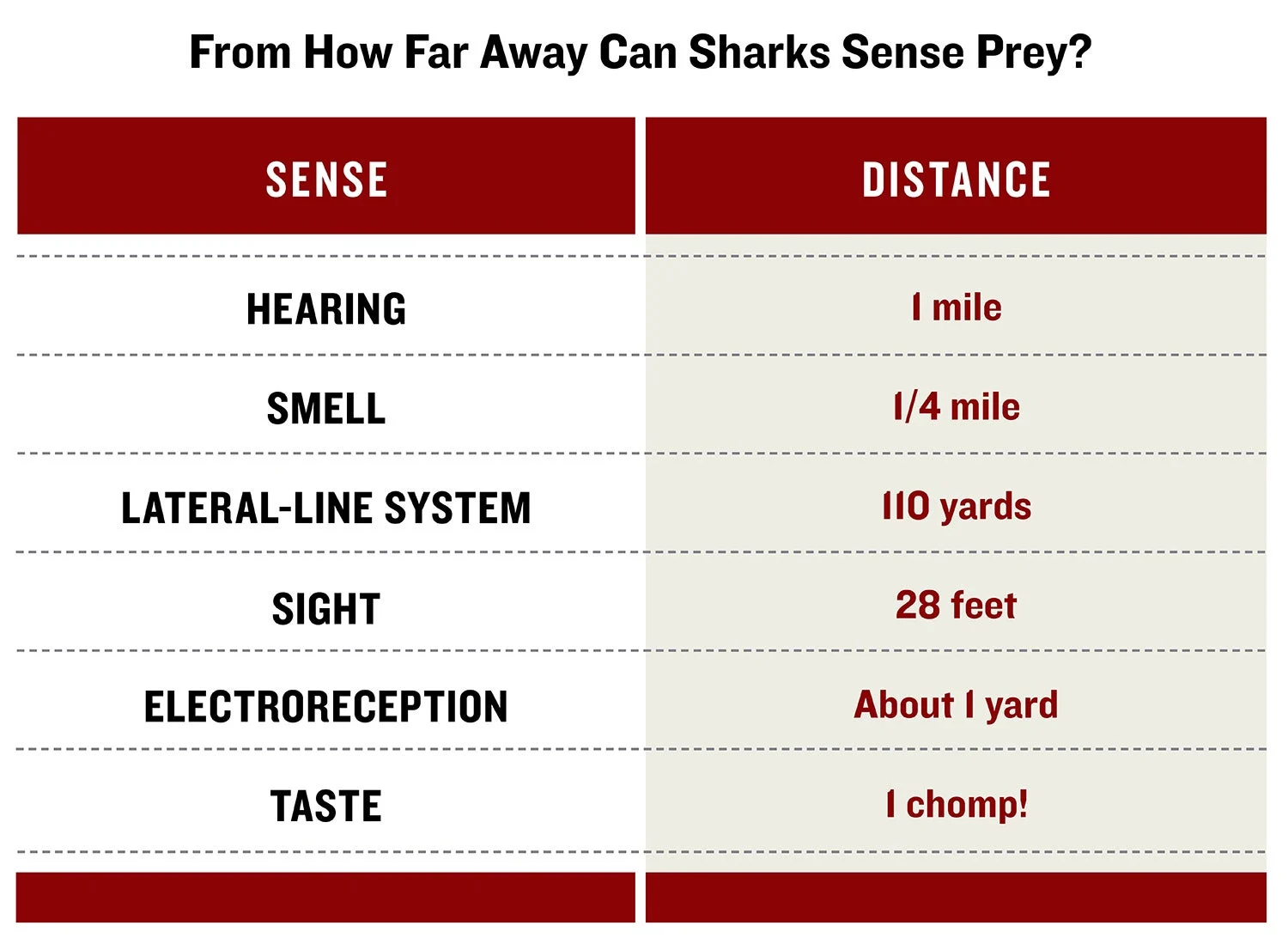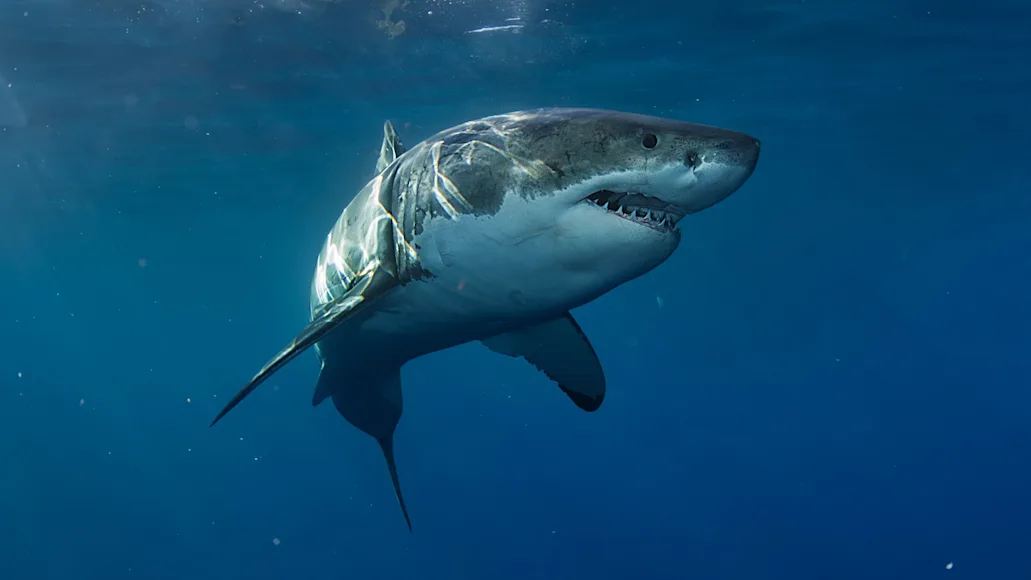When it comes to sharks, myths abound. You’ve probably heard, for example, that sharks can smell a single drop of human blood from a mile away. Which is no doubt, in many of our imaginations, just a tail swish from a frenzy of serrated triangular teeth and whole clouds of blood in the water. Well, while there may be a drop of truth in this common belief, it’s mostly false. So, just how far can sharks smell blood?
Sharks do have an exceptional sense of smell, among their other formidable attributes. But, they cannot detect a drop of your blood from a mile away. And, even if they could, the odds they would attack are very slim. In this article, we’ll explain the incredible sensory powers of the ocean’s most feared apex predator and dispel the mile-away myth.
Table of Contents
Sharks’ Incredible Sense of Smell
Debunking the Myth
The Chances of a Shark Attack, Blood or No Blood
Sharks Are Not Even Attracted to Human Blood
The Other Amazing Sensory Powers of Sharks
So, How Far Can Sharks Smell Blood?
Frequently Asked Questions
Sharks’ Incredible Sense of Smell

Hammerheads, utilize pores in the skin around their snouts, known as ampullae of Lorenzi, to locate prey that is hidden beneath the sand. Adobe Stock / Janos
The part of the myth that is indisputably true is that sharks have an amazingly acute sense of smell. While mammal nostrils are used to both smell and breathe, shark “nares,” located on either side of the snout, specialize in catching whiffs. They open into olfactory chambers containing a long row of thin flaps that maximize the organ’s surface area. The flaps are lined with sensory cells, called olfactory epithelium, which can detect minute scent molecules in the water and send corresponding messages directly to olfactory bulbs in the monster’s brain.
The result is that some species of sharks, according to Ripley’s Believe It Or Not, can smell hundreds of times better than humans. Amazingly, by sensing which nare captures a smell first and waving their snouts left and right as they swim, sharks can also trace the locationof a smell’s origin.
Debunking the Myth
Despite many fears out there, no shark will soon be zeroing in on you if you step on a sea urchin.
Scientists have found that sharks can detect scent molecules when they are diluted as sparsely as one part in 10 billion, according to a study published in the Journal of Experimental Marine Biology and Ecology. But scent molecules are so small and H2O molecules so many, that ratio translates into one drop of blood in a mere Olympic-sized pool. When there is a full-blown scent plume circulating in a current, like from a large bleeding fish or from a scientist dumping a cooler of fish oil in the water, some sharks can detect and trace the smell from as far as a quarter mile away. But, given differences in shark species, and considering varying current speeds and directions, there is a far better chance that the shark will miss the smell entirely from that distance.
The Chances of a Shark Attack, Blood or No Blood
The other part of the myth that needs debunking is the overblown concern that a shark, even within a range in which it could smell your blood, will attack. Sharks, of course, do attack and kill human beings every year. But, hundreds of millions of people yearly swim or wade in the ocean and only a minute fraction of them get attacked by sharks. Last year, there were 57 shark attacks on humans worldwide, five of which resulted in fatalities. The odds of being attacked in the U.S., which had the world’s most attacks last year by far, are one in 11.5 million, and the odds of being killed are less than one in 264.1 million.
Sharks Are Not Even Attracted to Human Blood

Despite many fears out there, no shark will soon be zeroing in on you if you step on a sea urchin. Adobe Stock
In almost all cases, sharks are not attracted to human blood, since humans are not on sharks’ natural prey menu. It is likely sharks attack when mistaking humans for seals or sea lions. The first bite, while often very damaging, is simply a taste-test. Since humans typically do not pass the test, far fewer are killed compared to the number attacked.
The Other Amazing Sensory Powers of Sharks
While formidable, a shark’s sense of smell is not the only trick in its bag. In fact, without its lateral line system, it would not even be able to locate its prey after smelling it. Some shark species, meanwhile, use electroreception, the ability to detect the electrical impulses of other living things, to locate prey. Hammerheads, for example, utilize pores in the skin around their snouts, known as ampullae of Lorenzi, to locate prey that is hidden beneath the sand. The chart below outlines how far away sharks can detect prey using their various senses.

So, How Far Can Sharks Smell Blood?
Under optimal circumstances—a large cloud of scent molecules that do not get too broadly diluted, a fast-moving current, and a current that intersects directly with a shark’s path—a shark can pick up the smell of blood from a quarter mile away. Otherwise, a shark is more likely to use hearing to detect prey from a long distance.
Frequently Asked Questions
Can sharks smell period blood? They can, but they are not likely to react to it.
Are sharks attracted to the smell of human urine? No, they are not.
Is it safe to swim with sharks on your period? Just as safe as it is for any other human.






